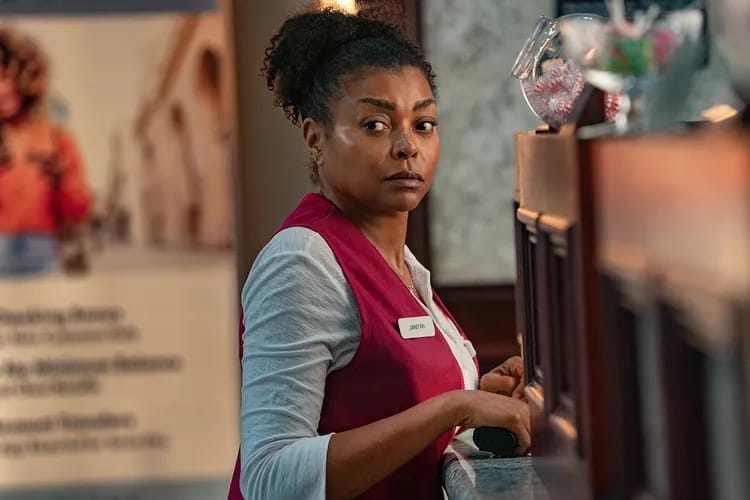(Spoiler alert: Tyler Perry’s Straw is spoiled in this article and the accompanying podcast.)
Tyler Perry’s Straw has a deceptive title. It seems like it refers to a single mom named Janiyah (Taraji P. Henson) driven to extremes by a metaphorical straw that broke the camel’s back. But in fact, as the film reveals very late in the game, she’s actually pushed over the edge by a cataclysmic trauma that shatters her whole existence.
In the latest Low Key podcast, your hosts Keith, Aaron, and Tim consider the possibilty that the whole movie takes place in Hell — just like the Jean-Paul Sartre’s 1944 existentialist play No Exit. You can listen wherever you get your podcasts, or right here:
The grim message of Last Exit is “L’enfer, c’est les autres” — or “Hell is other people,” meaning the worst fate is to be trapped with fellow humans, the ultimate tormentors.
No Exit takes place mostly in a single room where three characters are stuck together for eternity. The Tyler Perry film takes place mostly at a bank called Benevolent Bank and Trust, where Janiyah accidentally takes hostages, including benevolent bank manager Nicole (Sherri Shepherd).
The movie doesn’t seem, on the surface, to have supernatural inclinations — but then its very twisty final act makes us question everything we’ve seen before.
Also Read: The Top 5 Movie Twist Endings of All Time
Understandably, the film has drawn intense attention: In its second week, it doubled its audience to nearly 50 million viewers, securing its place as Netflix’s biggest hit movie of the year.
Straw Ending Explained?
With that success has come the usual slew of “Tyler Perry’s Straw Ending Explained” types of articles that the Internet does for every movie, no matter how unambiguous its ending.
But for Straw, all the ending-explanation stories are actually justifiable — because the ending is truly so hard to hard to comprehend. It almost demands that you rewind and watch the movie — or at least some key opening scenes — again.
As we say in the podcast, whatever you think of Perry, you have to give him credit for recognizing that his main audience of Black women was tremendously underserved until he found his very successful niche with films that aim to entertain, inspire, and commiserate with them. The new film is the latest in his more than two decades of projects centered mostly around Black women.
It’s also a laudable salute to single mothers, and a well-deserved middle finger to people who go out of their way to make their lives harder.
And within Perry’s film is a fascinating condemnation of people in all sorts of jobs — from police officer to grocery store manager — who are willing to put their humanity aside to advance in their careers. Hell is indeed other people, when they sell their souls.
But the film also conveys the message that people are also the way out of Hell — especially people who put humanity above their jobs to bend rules and listen to people in need. It’s a fascinating watch, And we hope our conversation about Straw is interesting, too.
This episode also veers off into many other topics, including movie twists and why they work or don’t work. We talk a bit about Fight Club, The Sixth Sense, and The Usual Suspects.
We also get into the joys of the Den of Thieves movies, and there’s also a kind of long digression about how to pronounce “San Pedro,” the name of the section of Los Angeles where Gerard Butler’s family lives in the film.
We wrap up with some appreciation for Tubi’s new film Flew’d Out, and for the works of fantasy author Brandon Sanderson. If you like what you hear, please subscribe, tell or friend, or do whatever you want.
Main image: Taraji P. Henson in Tyler Perry’s Straw.
